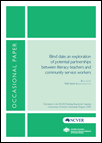Description
Partnerships between literacy teachers and community service workers have the potential to engage people with low literacy levels in learning. Through interviews and surveys with these two groups, this paper explores their views on literacy, how it impacts on their work, and their ideas about partnerships with each other. Overall, partnerships are viewed more favourably by literacy teachers than community service workers. In addition, if partnerships are to proceed, both groups need to develop a greater awareness and appreciation for each other's roles. This research was undertaken by a novice researcher in the Community of Practice Program and was funded as part of NCVER's Building Researcher Capacity initiative.Summary
About the research
Building the research capacity of the vocational education and training (VET) sector is a key concern for the National Centre for Vocational Education Research (NCVER). To assist with this objective, NCVER supports a community of practice scholarship program, whereby VET practitioners without research experience are given the opportunity to undertake their own research to address a workplace problem. Scholarship recipients are supported by a mentor, and NCVER publishes their research results.
Ann Leske participated in the 2009 community of practice. Ann is an adult literacy teacher and TAFE STEPS program coordinator at the Wagga Wagga campus of TAFE NSW's Riverina Institute. Ann's research investigates the potential for team-teaching partnerships between literacy teachers and community service workers from the perspectives of these two groups.
The study comprised interviews and surveys with community service workers and literacy teachers to uncover their views on partnerships with each other.
Key messages
- Overall, literacy teachers are more positive about the potential for partnerships than community service workers. The majority of community service workers view literacy teachers as consultants rather than as partners.
- Both groups of professionals have differing views about the meaning of literacy. These divergent views can be an obstacle to forming successful partnerships.
- Community service workers are unsure about what literacy teachers actually do. If partnerships are to proceed, both community service workers and literacy teachers need to develop a greater awareness and appreciation of each other's roles.
Tom Karmel
Managing Director, NCVER
